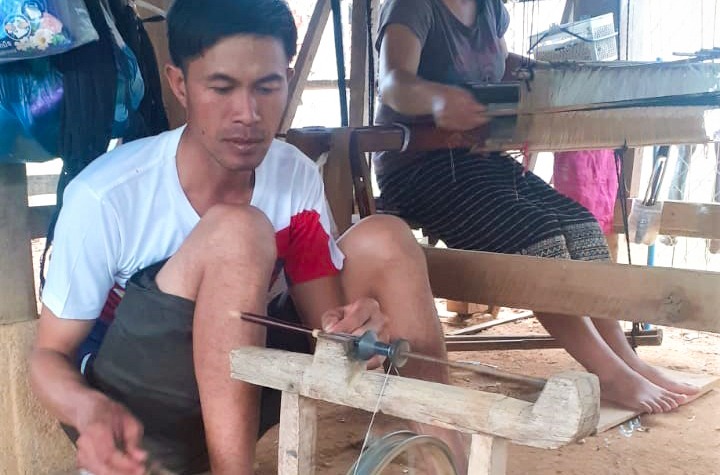
Bounyord Hakpanya (above) is a construction worker from Ban Sarm, a village located in the Kham District in the Xiengkhoung Province of the Lao People’s Democratic Republic. Bounyord Hakpanya had the opportunity to attend a training for microenterprise owners offered by USAID Laos Microenterprise, a five-year activity funded by USAID and implemented by ACDI/VOCA. USAID Laos Microenterprise aims to strengthen the competitiveness of local agricultural microenterprises by promoting better access to business skills, modern technologies, finance, and more.
Before attending the training, the father of two paid little attention to his wife’s weaving business. His wife spent much of her time caring for the children, preparing meals for the family, feeding and tending to the family’s animals, gardening, and handling other household work. She used what little free time she had to weave. However, she could hardly finish weaving two pieces a week. Neither Mr. Hakpanya nor his wife recognized the financial potential of weaving. Even though Mr. Hakpanya’s job as a casual laborer meant financial instability, he did not see his wife’s weaving abilities as a viable economic opportunity. Instead, the family began growing vegetables and rearing poultry to sell as supplemental income.
Mr. Hakpanya and his family not only lacked the business skills to identify profitable activities they could engage in but also had little knowledge of recordkeeping. Without any budget or profit calculations, they never knew how much money they needed for a project or how much they spent on given expenses.
In September 2020, Mr. and Mrs. Hakpanya attended the Farming as a Business training offered by USAID Laos Microenterprise in Ban Sarm. They learned about budgeting, making a profit, marketing their products, practicing gender balance, and making smart business plans. The pair also learned about market analysis, family cash flow management, and the importance of keeping financial records.
Family Puts Business Training into Practice
Mr. Hakpanya and his family changed their approach to dealing with their finances soon after. Using a booklet he received from the training, Mr. Hakpanya started keeping a record of their income and compared the profits of each of their activities. In doing so, he learned that his wife’s weaving was not only more profitable than his construction work but also had the most potential for growth.
This prompted a change in Mr. Hakpanya’s behavior and mindset related to household work. Mr. Hakpanya now actively supports his wife around the house, allowing her more time for weaving. USAID Laos Microenterprise found that 52 percent of men involved in the training now contribute more to household chores and caregiving.
With a better gender balance at home, the family has doubled their weaving capacity from four days per piece to only two days per piece, allowing them to finish 15 pieces per month. They also applied the skills they learned at the training to start selling their weaving products on online platforms, such as Facebook, and for higher prices. Other family members have joined in the effort. Together, the business makes a monthly income of about LAK 8,400,000 per month, with a profit margin of about LAK 3,600,000.
“I am glad that I attended the Laos Microenterprise training. I am now more aware of our finances as a family, and I understand the impact of supporting my house at home. By helping [my wife] reduce the tasks she has to tend to in the house, she can now do more weaving, and, instead of the usual one piece in about a week, she can now do two.”
–Bounyord Hakpanya, a USAID Laos Microenterprise participant
Soon, the family plans to purchase a new weaving machine and open a shop to showcase their weavings. If things continue going well, they would also like to start buying weaving products from their neighbors and reselling them to earn a profit, forming a group of weavers who could then sell collectively and attract more customers. By applying the skills they learned from USAID Laos Microenterprise, the family’s income and aspirations have grown tremendously.
Learn more about USAID Laos Microenterprise.
Learn more about our work in Laos.








